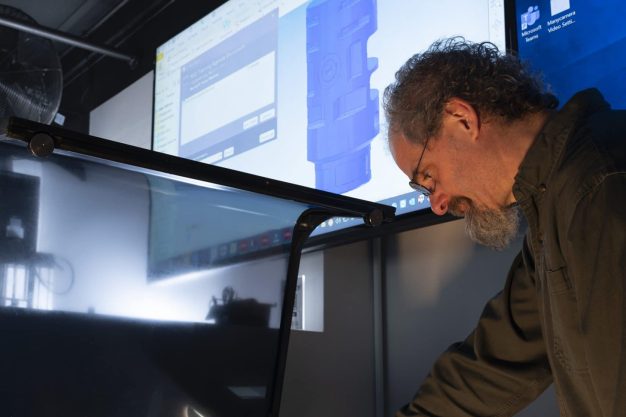
Inside Ripley Labs: A Q&A with our Director of Engineering
9th May, 2022
At Ripley Tools, we’re incredibly proud of our expert engineers at Ripley Labs, but they’re often so busy developing new products for our
The fiber industry, a cornerstone of modern telecommunications, has traditionally been a male-dominated field. However, the landscape is gradually shifting as more women enter and excel in this vital sector. According to the The Institution of Engineering and Technology, in the UK, women comprise just 29% of the workforce in science, technology, engineering, and math (STEM) fields, with an even smaller percentage working specifically in fiber engineering.
We aim to highlight the contributions and experiences of women in this industry through an insightful Q&A with Hannah Smith (@the_fibre_splicegirl), a Fiber Optics Engineer based in the UK. Discover how she navigated her career journey, the valuable lessons and skills she has acquired along the way, and her perspective on the future of women in fiber engineering as well as what companies can do to provide support.
I originally studied media makeup at university and continue to work as a makeup artist for photoshoots and weddings on weekends. However, I was eager to try something different, which led me to explore telecoms. At first, I was sceptical about entering an industry I hadn’t considered before, but after discovering that other women with backgrounds similar to mine were thriving in the field at my current company, I thought, “Why not give it a try?”
My journey in the industry began when I joined a comprehensive training program with CCN Communications. Throughout the program, I gained a diverse skill set, including certifications in:
• S8 – Overhead Cable Installation
• (PIA) S9 – Pole Stepping on Congested Poles
• Asbestos Awareness SA007
• First Aid
• IPAF Static Boom (1b)
• Manual Handling SA005
• NRSWA Unit 002 – Signing, Lighting, and Guarding.
• SA001 – Safety Overhead
• SA002 – Safety Underground
In addition to these certifications, I had the opportunity to develop essential on-the-job skills that helped me grow. CCN Communications has been incredibly supportive, continually providing training and courses to expand my knowledge. Through this ongoing learning and hands on experience, I have progressed from my initial training to becoming a Telecoms Engineer.
In the workplace, I’ve been fortunate to experience a supportive and welcoming environment. To begin with I struggled getting to grips with certain tools as I had never had to use them before but the team I work with are incredibly helpful. I’ve never faced any challenges at work based on my gender. However, sometimes I do encounter comments from the general public, such as “don’t break a nail.” While these comments can be frustrating, I don’t let them bother me. I focus on proving my skills and capabilities, and I’ve learned to brush off the negativity.
A solid technical understanding is key, but I also think problem-solving, attention to detail, and adaptability are crucial. The ability to work effectively in teams and communicate clearly play a big role.
Ripley’s tools, such as their cable stripping and cutting tools, have made a big difference in terms of efficiency and precision. Having the right tools is essential when working with delicate fiber optic cables, and Ripley’s products have really streamlined my work.
I am generally proud of all the work I’ve been involved in, as each project has contributed to my growth and expertise. One thing I really enjoy now is pointing out the poles and cabinets I have worked on to friends and family and saying, “I did that.” It’s a great feeling to see customers connected to the work I did and it reminds me of how far I’ve come in my career.
I mostly receive positive comments about my work, and it’s incredibly rewarding to get messages from others saying I’ve inspired them. However, I have had the occasional comment about my appearance or dismissive remarks like, “Oh, a woman did that, I’ll have to fix it now.” I don’t let these comments bother me. I simply block them and move on, focusing on the positive impact I’m making and the support I receive from others.
I’m focused on continuing to grow my technical expertise in fiber engineering and eventually taking on a leadership role where I can help mentor and inspire other women entering the industry.
Having more women in fiber engineering brings diverse perspectives and encourages creativity in problem-solving. Additionally, having women on the team can bring a calm and balanced energy, fostering a positive and collaborative work environment.
Additionally, companies should ensure that workwear is appropriately designed for women, as finding suitable clothing can sometimes be a struggle, given that most options are geared towards men. It’s also important to check in regularly with female employees to ensure they feel comfortable, supported, and safe in their roles.